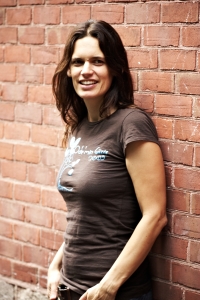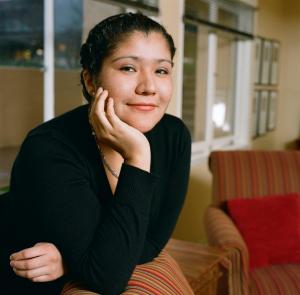Interview with Leanne Simpson
Falling Into Decolonial Love: An Interview with Leanne Simpson, Author of Islands of Decolonial Love: Stories and Songs
Tanaya: Thank you so much for allowing us to continue sharing your writing and gifts with our readers. I must say As/Us is a big fan of your work and we’re excited to do this interview.
Tanaya: Tell us about the title. How did you choose it? What does decolonial love mean to you?
Leanne: The title comes from an interview Junot Diaz did with the Boston Globe called “The Search for Decolonial Love”. I’ve always connected to Diaz’s work and I was working on the manuscript that would become Islands of Decolonial Love at the time. I started out wanting to write a follow up to Dancing on Our Turtle’s Back, so non-fiction and academic-y on gender, but at some point I became more interested in doing something, instead of writing about doing something. Within Nishnaabeg thought, theory is generated and regenerating from the ground up, and it has to be carried with you through your relationships and your life. So rather than write about how gender is conceptualized in a more fluid way or across a spectrum, I just created characters where that was true and normal. Rather than writing about gendered colonial violence, I created characters that had experienced that kind of violence but didn’t let it define them. Rather than talk about how my language doesn’t use gendered pronouns, I created a story where the gender of the main character isn’t revealed. That kind of thing.
I was also coming to understand in my own life that one of the most horrific parts of colonialism and on-going settler colonialism is that the trauma and damage it causes, the results of it’s violence is encoded in our emotional lives, our spiritual and intellectual lives and in our bodies and it plays out in how we relate to those we are closest to, the ones we love the most. I’ve always thought a lot of about land and politics and nationhood in an Indigenous context and this time I wanted to explore the nation within our bodies.
Diaz’s work was therefore interesting because he engages with similar issues albeit from a different perspective – a man of colour. Whenever I read him, I’m always creating counter narratives in my head of what his female lovers would be thinking and doing, especially imagining scenarios of what a strong, decolonizing Nishnaabekwe challenging him and loving him. In doing that, I came to really undo all the colonial racist and sexist stereotypes that infiltrated me as a very young girl. It became a project where I to some degree undid the shame and hyper-sexualization that gets coupled to the identity of Native women and redefine myself outside of the stereotypes of “squaw”, “dirty” and “slut”.
I was also really interested in exploring what decolonizing love looks like. How did my ancestors love? What were their sexual and gender orientations? Their relationship orientations? Their views on monogamy and family? How did they view romantic love and their sexuality? Consent? Agency? Because it seems to me, that despite everything, we are here today, living as Indigenous peoples because our Ancestors had a tremendous capacity to love their families, friends, lovers, their land, their culture and their community. That in some ways, is our greatest resistance.
Tanaya: Your work resonates on and off the page, how do you go about writing your stories and songs? Tell us about your writing process and why including your native language of Nishnaabemowin was/is important to your work?
Leanne: I think these tiny stories sort of catch me, so in the beginning of the process it is a little ephemeral. I know I have to live a very interesting life in all regards in order to be able to write. I have to be open and willing to go to places both externally and internally. I have to face and witness and engage the pain and trauma of being an Indigenous woman in 2014. I think most important, these stories are created within a web of vital relationships with my homeland, my friends and family and my life.
A few years ago now, I was performing as a storyteller as part of a collection of performance art as part of the Odemin Giizis Festival, an Indigenous arts festival in Peterborough, Ontario. There was an overlap in the schedule and the band OKA was preforming on the mainstage at the same time I was telling stories in the Tipii. They were so loud. I didn’t know what to do. So in the moment, I told my stories over their beats. The audience responded positively, and my practice grew from there.
The music takes care in a way of the audience’s emotional engagement with the poetry. It adds another layer. I have a lot of formal musical training from when I was a kid, but I’d never had the opportunity to use it in a practice. I’m learning that you have to write differently with music because there is already a narrative arc there if the music comes first (and actually most of the time it doesn’t). The storytelling has to be less dense and even more sparse than usual. Poetry is all about economy anyway, but when an audience might only hear the piece once live, I want them to get as much as possible. So right now, I’m learning a lot from my song-writer friends.
Tanaya: The writing in this collection operates on multiple levels by using music. Tell us about the accompanying soundtrack, do you do this with all of your collections or is it something new? Why was it important to you to include music?
Leanne: This is the first time I’ve done it, and I have a second album in the works. The soundtrack includes Indigenous musicians Cris Derksen, Tara Williamson, A Tribe Called Red, Nick Ferrio, Sean Conway, and Melody McKiver, and I sing a community song on one of the tracks. It is important for me to include music because music is an incredibly important part of my life, and it brings a collaborative nature to the process. Performing on stage with musicians is a dynamic process. When it goes well, I think the artists connect to the audience and together we create a literal island of decolonial love – a bubble where for a few minutes at least, we learn what it feels like to escape the chains of colonialism. It’s also so celebratory and fun. I also worry at readings that I’m boring the audience to tears, but when I perform it’s more like we’re falling into decolonial love together. So yeah – initially this record was about recording, and I’m so grateful that people connected to the recordings the way they did, but for me personally, this has now become about performing. For me to perform I have to confront every fucked up colonial and stereotype and fear that cycles through my body and I think that’s a very good thing to do.
Tanaya: Your book really reminds us that poetry can, is, and should be political. That importance is in its message and your writing shows the necessity of words being spoken, that a story spoken aloud and shared is more powerful, and that silence is never an option when teaching our communities how to love. How do you see the personal and political being rendered in your work?
Leanne: I’m an Nishnaabekwe and so everything I do is political. I think Indigenous women are really in many of our political systems the first politicians. We teach that system to our children. We embody nationhood. We have influence over all of the decisions of life and our power comes from the love we have for our families and homeland and bodies. We are also in our fourth century of genedered colonial violence and so I think we can’t afford to be anything but political. Teaching our kids our languages is political. Breastfeeding is political. Learning from our youth is political. Everytime we connect to any piece of our homelands, that’s political.
In some ways, I think my creative work is more political than my non-fiction, academic and activist work because in art, you don’t, you can’t really ask permission. You do. You make. You create. You’re responsibility is to smash boxes, not play nicely within their confines. And if you’re not connecting to your audience in a way that is transformative, I’m not sure I understand the point.
Tanaya: The roles people are ascribed and how they navigate those roles, particularly in terms of education, love and trauma come up quite frequently in the collection. Where does one’s learning come from? How does one learn to forgive, heal, let go, and simultaneously love?
Leanne: Well my learning came from my life. I think the violence of colonialism really damages our intimate relationships and Indigenous peoples have to continually work really hard to connect to each other in a way that is healthy. It’s an on-going collective process because we only exists in our relationships with each other. The question I think I ask in the book, is what if we focus in on this tiny little victories where love and connection win, even if that win is temporary? What if we amplify these little islands of decolonial love? What if they grow? What if we start to weave them together into the fabric of our collective lives?
Tanaya: One of the things I ‘love’ about this collection is that you cannot come through it unchanged, without questioning love, how we love, who is deserving of love, and how we engage with others in terms of our self-love. Can you talk about your intentions in writing Islands of Decolonial Love? What are you hoping the reader comes away with after reading this collection?
Leanne: Miigwech. That is a tremendous compliment. I started out in way writing this for myself. I wanted to put my own truths to paper through the characters in the story and coming at it from an unapologetic place of strength. I wanted to write these stories for an Indigenous audience first. That’s why I included my language. That’s why the informal tone and style. I wanted them to be read as if you were ease dropping on a conversation between friends, Native friends. It is still too rare we see accurate and real reflections of Indigenous women in print. I wanted my Indigenous audience to be able to seamlessly identify with the characters, to see their own strength love and humour reflected back to them. I wanted them to get the cultural and oral tradition references, and the inside jokes without explaining them. I write to strengthen us. I want my audience to come out transformed – feeling a little more seen and loved and appreciated. I think leaving your audience in a better place than when they found you is kind of a wonderful thing if you can make it happen.
Tanaya: Thank you for reminding us that when “the scene doesn’t make sense” we have words, and there is power in words such as in “sing them home.” Thank you for this book. Truly, reading Islands of Decolonial Love: Stories and Songs is just like coming home.
Leanne: Ah! Such exceptionally kind words. Chi’Miigwech.
 Leanne Simpson is a writer of Mississauga Nishnaabeg ancestry. She is the editor of Lightning the Eighth Fire: The Liberation, Protection and Resurgence of Indigenous Nations (Arbeiter Ring) andThis is an Honour Song: Twenty Years Since the Blockades (with Kiera Ladner, Arbeiter Ring). She is the author of Dancing on Our Turtle’s Back: Stories of Nishnaabeg Re-Creation, Resurgence and a New Emergence (Arbeiter Ring) and The Gift Is in the Making, a re-telling of traditional stories, forthcoming Spring 2013 (Debwe Series, Highwater Press). Her first collection of short stories, Islands of Decolonial Love is now available from Arbeiter Ring.
Leanne Simpson is a writer of Mississauga Nishnaabeg ancestry. She is the editor of Lightning the Eighth Fire: The Liberation, Protection and Resurgence of Indigenous Nations (Arbeiter Ring) andThis is an Honour Song: Twenty Years Since the Blockades (with Kiera Ladner, Arbeiter Ring). She is the author of Dancing on Our Turtle’s Back: Stories of Nishnaabeg Re-Creation, Resurgence and a New Emergence (Arbeiter Ring) and The Gift Is in the Making, a re-telling of traditional stories, forthcoming Spring 2013 (Debwe Series, Highwater Press). Her first collection of short stories, Islands of Decolonial Love is now available from Arbeiter Ring.
 Tanaya Winder is a writer, educator, and motivational speaker from the Southern Ute, Duckwater Shoshone, and Pyramid Lake Paiute Nations. She grew up on the Southern Ute Indian reservation and attended college at Stanford University where she earned a BA in English. After college, she pursued her passion of poetry and received her graduate degree a MFA in creative writing from the University of New Mexico. Since then she has co-founded and serves as the Editor-in-Chief of As/Us: A Space for Women of the World, a literary magazine publishing works by Indigenous women and women of color. She is a Gates Millennium Scholars Class of 2004 Alumna, who serves as a Regional Advisor for the GMS Alumni Association Advisory Council. A winner of the 2010 A Room Of Her Own Foundation’s Orlando prize in poetry, her work has appeared or is forthcoming in Superstition Review, Drunkenboat, Kweli, and Bellevue Literary Review among others. Her poems from her manuscript “Love in a Time of Blood Quantum” were produced and performed by the Poetic Theater Productions Presents Company in NYC. She teaches as an adjunct professor at the University of New Mexico in the Chican@ Studies Program.
Tanaya Winder is a writer, educator, and motivational speaker from the Southern Ute, Duckwater Shoshone, and Pyramid Lake Paiute Nations. She grew up on the Southern Ute Indian reservation and attended college at Stanford University where she earned a BA in English. After college, she pursued her passion of poetry and received her graduate degree a MFA in creative writing from the University of New Mexico. Since then she has co-founded and serves as the Editor-in-Chief of As/Us: A Space for Women of the World, a literary magazine publishing works by Indigenous women and women of color. She is a Gates Millennium Scholars Class of 2004 Alumna, who serves as a Regional Advisor for the GMS Alumni Association Advisory Council. A winner of the 2010 A Room Of Her Own Foundation’s Orlando prize in poetry, her work has appeared or is forthcoming in Superstition Review, Drunkenboat, Kweli, and Bellevue Literary Review among others. Her poems from her manuscript “Love in a Time of Blood Quantum” were produced and performed by the Poetic Theater Productions Presents Company in NYC. She teaches as an adjunct professor at the University of New Mexico in the Chican@ Studies Program.
